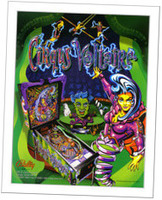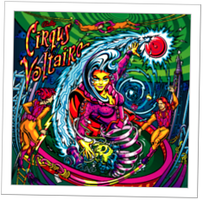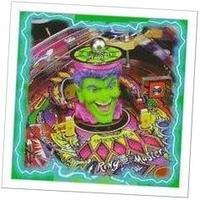Cirqus Voltaire Pinball Machine: Circus History
 September 30, 2015
by
David T. Allen
September 30, 2015
by
David T. Allen
Normally, pinball machines tell you, “Don’t do drugs” and, “stay in school.” But, during our latest visit to Pinball Perfection, the Cirqus Voltaire machine had a little more to say.
Joining the circus is the objective of this game, which I thought fit nicely with Leisl in Dream Eater’s Carnival.
When I got home, I found the manual on the Internet Pinball Database and spotted the story on page 16. I spent a little time digging around on the machine’s web page, which was from 1997 (and referenced Netscape and Real Player).
The dotmatrix animations are charming. Here’s a few from their original site:
The rest of this article comes from the Cirqus Voltaire pinball manual:
The mesmerizing cirqus performances of today have evolved from the early Romans and their acts of bravery and challenge.
The arena held the greatest daily performances as gladiators riding chariots could be seen alongside jugglers, tightrope walkers and fire eating cows.
The word “Cirqus” literally means “Ring,” and traditional rings were established as boundaries for horses to gallop within.
All cirqus performers disbanded and scattered after the fall of Rome in 476 A.D.
1771 was a rebellious time for the famous M. Voltaire, an enlightened philosopher and general scholarly rascal.
He was famous for his writings and his spirit for living.
His passion grasped the arts and the cirqus, and in 1772 founded a show in Paris with the “Father of the Cirqus,” Phillip Astley. Voltaire then brought together a group of the most talented street performers and poets of modern day France, and founded the “Troupe le Voltaire” or “Voltaire’s Group.”
The name, “Cirqus Voltaire” was first spoken by Voltaire himself, during a tense game of bagatelle at the Café Procope.
Along with their works of the pen, the cirqus talent included tiger tamers, high wire fellows, the lightning-ball jugglers, and powerful cow throwers.
The Cirqus Voltaire had the most marvelous acts of bravery and passion, the same that willed France toward revolution in 1789.
The rest of the story and passion is… … well … To be played by you!
So come join the “Cirqus Voltaire!”











